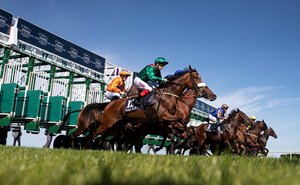Horse Racing Ireland Releases 2020 Industry Figures


The stark reality of the consequences of COVID-19 on Irish racing has been revealed after Horse Racing Ireland released its industry figures for 2020, with an increase in the number of horses in training for the fourth time in five years and the number of fixtures saved the only real positives to be taken out of a torrid year.
Racing has remained behind closed doors in Ireland since mid-March, so it came as no surprise to see attendance down 91% compared to 2019, or on-course betting falling by 89% to just €7.7 million from €68.3m.
Prize-money was hit too, down €16m (23%) from 2019 with commercial sponsorship falling by almost 69%.
Bloodstock sales suffered a severe blow and were reduced 35% on the 2019 figure, from €165m to €106m.
There were, however, some positives in the report. HRI managed to save 332 fixtures in 2020, down just 8.5% from the 2019 number of 363.
There was a 3.3% increase in the number of horses in training in Ireland from 8,949 to 9,248.
The number of active owners also increased to 4,080, a rise of 0.5%, and there was a modest increase in the number of sole owners/partnerships and syndicates, while the amount of companies registered as owners remained the same.
Racing clubs rose by 6% and owner retention is at 73.6%, a decrease of 1.5% on the previous year. The owner retention figure refers to the percentage of active owners in 2019 who made a race entry in 2020.
"The figures for the numbers of horses in training continued to grow year on year, and this says so much about those involved in racehorse ownership," said HRI chief executive Brian Kavanagh.

"It is a testament to their resilience in the face of very challenging circumstances that they continue to stand by the industry, and we look forward to a time when we can safely welcome owners—and obviously racegoers—back to our racetracks.
"Owners ongoing support is felt across the board, and the numbers of horses in racing yards directly reflects on employment levels within the industry and on widespread economic activity in rural Ireland."
Kavanagh added: "It was a year when bloodstock sales companies showed remarkable flexibility on a number of fronts. There were changes to sale dates and locations, and there was extensive use of online sales. While this facilitated some trade, inevitably the end-of-year figures were well down on what might have been expected, and this is a priority area for 2021.
"Like many other sectors, the Irish horse racing and breeding industry had a difficult 2020 and while there are some positives, effectively any comparison with previous years is futile.
"The continued absence of attendance is having a significant impact on racecourses. We acknowledge the hardship endured by on-course bookmakers, Tote, caterers, and the many other businesses that depend on racecourses and racegoers, and Horse Racing Ireland and the Association of Irish Racecourses are eager to welcome everyone back once it is deemed appropriate by the government."
Trainers in Britain this month lamented a 42% drop in prize-money for last year, which was the lowest level for 18 years.
